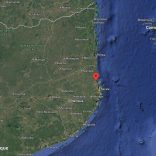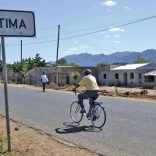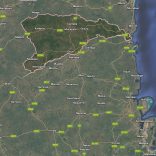Mozambique: At least 51 homes, a church and a school destroyed in Memba district since late ...
João Perreira: “There is a change in strategy in the terrorist group’s activities”

Photo: O País
Political scientist, professor and researcher João Pereira lived in Cabo Delgado for two months while studying the terrorism situation in that part of the country, and on STV Notícias programme Noite Informativa this Monday, he delivered his diagnosis of the situation before and after the presence of foreign forces on the ground.
Pereira addressed the dynamics of the terrorist groups which, since 2017, have been killing, destroying public and social infrastructure and creating panic within local communities.
He began his analysis by saying that “what is happening is normal”.
The political scientist then describes the dynamics of the conflict for a better understanding on the part of Mozambican society.
“There are two things to understand,” he began. “The first major issue is that there is an increase in military operations carried out by the Defence and Security Forces, Rwandan troops and SAMIM. If there is an increase in operations, for example, a greater offensive by this group of military actors on the ground, then there is a change in the strategy of action of the group itself in relation to the offensive and to a whole apparatus of actions and operations on the ground.”
The professor explains that, with the intensification of operations in the field by the joint forces, the terrorist group, as in other countries where they operate, changed its strategy of action.
“Even compared with the other movements, these groups stop acting in large blocks and end up acting in small blocks. And they often affect territories where the presence of the state or military forces is limited. They take advantage of this type of small attacks, often with great intensity by burning houses, decapitating people and looting. They use social media to give it a very large scale when deep down it is not so much a large-scale attack,” he said.
He mentioned, as an example, that “when there was the incursion, a few hours after the organisations that are working on the ground with stabilisation and social cohesion initiatives in Mocímboa and Palma, they looted public granaries”.
Because this was an action by the so-called Al Shabab group, says Pereira, “any individual in a situation of emotional crisis and conflict would eventually leave the area”.
João Pereira discussed the transformation of small-scale actions into large-scale phenomena.
“Afterwards, external actors, mainly on social networks and some figures who analyse the national situation, gave an indication of a very small phenomenon which had a large effect. Groups like Al Shabab and Boko Haram often use this type of strategy. Often, when operating in situations where they are in the minority, they recruit networks of, for example, young criminals, to amplify their own actions.”
“Cut the terrorists’ lines of supply”
The recent intensification of military offensives in Northern Mozambique has cornered the terrorists, just as government officials say.
“This is a reality that we must face in the coming years. In this respect, I have to agree with what has been said, because it is real. There are two things that are noticeable on the ground: first, there is a major offensive by the Defence and Security Forces, Rwandan troops and SAMIM, to cut off all logistical support to the group locally known as Al Shabab. This war can be won in two ways. On the one hand, by military action. There is no one who says today that military action is not decisive in a conflict zone of this dimension.”
The political scientist further says that it is still necessary to cut the terrorists’ lines of supply.
“So, as defence and security troops with the allies we have in the region, they are carrying out two simultaneous processes. First, cut off the supply of weapons to the Al Shabab group. And, secondly, to make the logistical issue difficult in situations where they are put under great pressure and, often, without the ability to react.”
“The third element that needs to be moved forward,” he continued, “is to eliminate Al Shabab’s source of recruits. It is necessary to map this very well, to ascertain how these people get to Al Shabab. If we manage to control these three dimensions and then work on the three components which are crucial in this whole process, we have a holistic approach. It is necessary to work on other dimensions as a social whole, including the governance dimension and the improvement of the services provided by the state.”
By Aristides Cavele













Leave a Reply
Be the First to Comment!
You must be logged in to post a comment.
You must be logged in to post a comment.